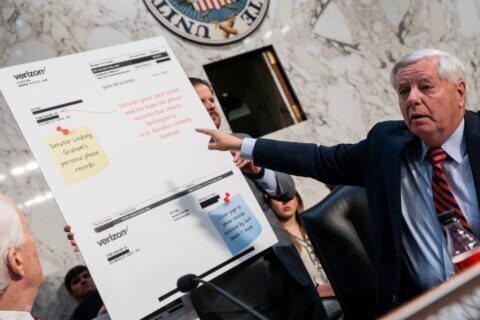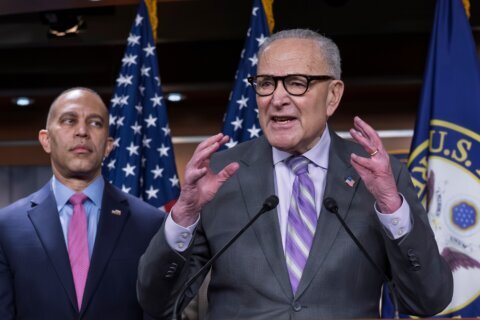For all the latest developments in Congress, follow WTOP Capitol Hill correspondent Mitchell Miller at Today on the Hill.
Congress faces major challenges ahead in 2024, after a tumultuous year that included the ouster of the House Speaker, a self-imposed shutdown when Republicans were unable to choose a new leader and one of the most fallow legislative stretches in its history.
The 118th Congress is widely considered one of the least productive ever.
While the House conducted nearly 750 votes, only 27 became law.
Creating more laws is of course not the only measure for assessing the productivity of Congress, but even in recent years of divided government, lawmakers have passed more than 70 bills into law.
“It was a weird year,” said U.S. Sen. Tim Kaine, D-VA., summing up a view held by many lawmakers.
The critical view is held by Republicans as well as Democrats.
“I want my Republican colleagues to give me one thing — one — that I can go campaign on and say we did. One!” thundered Rep. Chip Roy, R-TX., as he vented his frustration on the House floor last month.
House Speaker election foreshadowed dysfunction
The year began with Republicans having a very difficult time agreeing on whether their new House Speaker should be veteran California lawmaker Kevin McCarthy.
Ultimately, it took close to a week and 15 votes before McCarthy was elected on a vote that ended after midnight on the weekend of Jan. 7.
It was the longest battle to elect a House Speaker since the Civil War era.
“My father always told me, ‘It’s not how you start, it’s how you finish,'” McCarthy said.
He brushed off warnings that deals with conservatives could later come back to haunt him, like allowing a single lawmaker to make a motion to vacate the chair — in other words, vote to kick him out.
For a while, he was able to hold together his often unwieldy GOP conference, which controlled the House by just a handful of votes.
He managed to reach an agreement with the White House and Democrats on the debt ceiling.
But while he helped get it through Congress, hard-line Republicans ultimately rebelled and pressed for him to renege on the deal, to push for deeper spending cuts.
Speaker McCarthy gets the boot
Ultimately, what did McCarthy in was his willingness to work with Democrats, to pass a short-term spending bill to avoid a government shutdown.
Conservatives and members of the House Freedom Caucus were furious that McCarthy was willing to rely on Democrats to help pass the continuing resolution.
Soon, Rep. Matt Gaetz, R-FL., did what many had warned about back in January — he made the motion to vacate the chair.
Eight Republicans, along with Democrats, voted to oust McCarthy from the speakership.
It was the first time in the history of the House of Representatives that a party had voted to kick out its leader.
“Doing the right thing isn’t always easy, but it is necessary,” McCarthy said after the vote. “I don’t regret standing up for choosing government over grievance.”
Republicans in disarray
As if there hadn’t been enough dissension within the House GOP, Republicans were unable to coalesce around a new House Speaker for more than three weeks, leaving the House paralyzed.
Even longtime lawmakers were hard-pressed to remember the lower chamber in such disarray.
Week after week, they held closed-door meetings in October, which often became venting sessions.
Republicans nominated several people to succeed McCarthy, but ultimately couldn’t agree on any of them.
Three floor votes to elect House Judiciary Committee Chair Jim Jordon failed.
House Majority Leader Steve Scalise withdrew as the nominee before a floor vote was taken.
House Minority Whip Tom Emmer withdrew hours after being chosen as the nominee, after former President Donald Trump publicly questioned whether he was the right person for the job.
Exhausted and with many lawmakers embarrassed at their inaction, Republicans finally in late October chose a conservative Louisiana lawmaker not well-known beyond the halls of Congress. Rep. Mike Johnson was voted House Speaker and given the gavel.
Santos sideshow
House Speaker Mike Johnson had to quickly navigate the choppy political waters of his GOP conference, working to find a way to avoid another government shutdown before the end of the year.
But he had another problem: what to do with Rep. George Santos, R-NY.
Santos, who lied about virtually every part of his personal and professional background before getting elected to Congress, had also been charged in a 23-count federal indictment.
But pressure increased for a House vote to expel Santos after the House Ethics Committee released a scathing report alleging that Santos had used his campaign fund to purchase vacations, designer clothing and Botox treatment.
Johnson opposed ousting Santos before his trial, but agreed to allow a vote.
Santos was expelled, becoming the first lawmaker kicked out of Congress in more than two decades.
House members have also recently stepped up efforts to censure lawmakers, which is a much less severe sanction.
Rep. Jamaal Bowman, D-NY., this month became the third Democratic lawmaker to be censured this year.
He was censured for setting off a fire alarm during a vote earlier in the year when the House was voting on a short-term spending bill to avert a government shutdown.
Republicans accused him of setting it off to cause a delay so Democrats could get to the floor for the vote.
Bowman claimed it was an accident but had earlier pleaded guilty to a misdemeanor for tripping the alarm.
What’s ahead in 2024?
The wild ride in Congress didn’t come to an end in 2023.
Lawmakers will need to act quickly when they return the week of Jan. 8, with the first government shutdown deadline on Jan. 19 and the next on Feb. 2.
Senate negotiators during the holiday break, meanwhile, have been trying to get to a framework for agreement on border security issues, to free up tens of billions of dollars for Ukraine and Israel in a foreign aid package.
U.S. Sen. Mark Warner, D-VA., believes it is critical to get a vote on that legislation in January.
Looking back on the past year, he acknowledges the assessments that it may have been one of the least productive in recent history.
Warner said it is hard to ignore what happened in October, when almost an entire month of the legislative calendar in the House was lost to a GOP that couldn’t choose its leader.
“That was frankly embarrassing to anybody who serves in Congress and I think undermines the public trust,” he said.
But Warner tried to sound a hopeful note heading into the New Year.
He said he hopes Congress can “turn the page” on the dysfunction of this year.
“The reason I’m so much in favor of bipartisanship is because then both parties have to own both the good and the bad,” he said.








